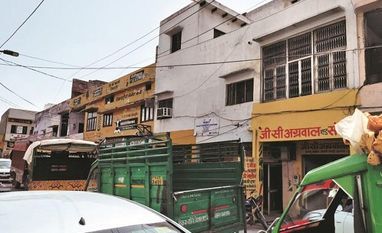Agra has long been known for the Taj Mahal, but it is also a manufacturing hub filled with micro, small and medium enterprises (MSMEs) that make everything from electronic components to metal products, from paints and chemicals to footwear. And five years after the introduction of the Goods and Services Tax (GST), the MSMEs here complain that while the indirect tax regime has been transformative, cutting out the need to file multiple taxes, its biggest drawback has been the delay in credit refunds.
Whoever you speak to — MSME owners, tax lawyers, or industry bodies like the National Chambers of Industries and Commerce (NCIC), Agra Footwear Manufacturers and Exporters Chamber (AFMEC) and Agra Shoe Manufacturers Association (ASMA) — they all emphasise that the GST continues to face some key challenges.
“Implementing GST was a welcome step. But the teething problems remain. The biggest one is when a business deals with a supplier and pays GST, and the supplier does not. This means input tax credit is denied,” says Shalabh Sharma, who runs a paint and chemicals business and is also the president of the NCIC.
Sitting in the offices of the NCIC, located in the heart of old Agra, in a lane crammed with trading establishments, Sharma says that there have been many cases, especially during the Covid-19 pandemic, when a genuine supplier or vendor has been forced to shut shop due to working capital or business issues. The input tax credit (ITC) owed from that establishment is then stuck forever.
“In some cases, the business owner has to be prepared that up to 20-25 per cent of the credit stuck in the system will never reach him,” Sharma says. “It is possible that the refunds are delayed because the government wants to show healthy GST collections,” he adds.
Another issue is that while income tax allows for updated returns, where a person has the chance to correct an error, the same is not possible in the case of GST.
“We understand the need to clamp down on fraud. But there should be a provision to correct bona fide mistakes or clerical errors. There is no provision to fix these errors on GST forms or in updated returns. This causes huge distress for businesses,” says Sushil Maheshwari, a chartered accountant in Agra.
Rule changes that worry CAs and tax lawyers
Though unwilling to go on record, the owners of MSMEs in Agra talk about the bribes they have had to pay to get their input tax credit released and other GST work done, since many of their suppliers and vendors had to close shop due to the economic slowdown during the pandemic.
Besides, adds Maheshwari, “When the owner of a proprietorship company dies, the GST number does not pass on to whoever is taking over the business next. They have to apply for a new GST number and that takes a couple of months. So no business till then. We had many such cases during the pandemic.”
Rajiv Wasan, owner of AT Exports, which manufactures and exports footwear to Europe, has a sprawling factory on the outskirts of Agra. “Overall, GST has been a fantastic move for the organised sector, and especially for the export-facing companies,” he says. “For the domestic-facing one, however, it has been tougher. The inverted duty structure issue for footwear, which was in existence till recently, was bad.”
Wasan is the general secretary of AFMEC, which comprises shoe manufacturers who only export to other countries. The other body, ASMA, is for footwear makers who sell in the domestic market. Its president, Opinder Singh Lovely, spoke of the same issues, including the frequent changes in rules, rates and clarifications.
“There have been too many changes in the GST laws and rules. For an average MSME business owner or even chartered accountants and lawyers, it is getting difficult to keep up. We appreciate the fact that steps are being taken to deal with loopholes, corruption, fraud etc. But every time there is a GST Council meeting, you will see a spate of changes, whether on filing dates or forms, e-way bills, refunds, rates etc,” says Anil Verma, an Agra-based tax lawyer.
Business ranking of GST
Most businesses admit that by and large, and with the exception of some cases during the pandemic, their dealings with GST officials have been fair. Whatever can be sorted out at the local level is dealt with through constant interactions with government officials, while bigger issues are sent up the administrative chain to New Delhi.
Another issue that irks businesses is that while input tax credit can be availed on goods, it cannot be availed on services.
Moreover, Mayank Mittal, vice-president of NCIC, points out, “There was supposed to be a business ranking of GST. Companies were to be ranked on the basis of how promptly they file GST returns, whether they have defrauded or evaded, etc. That has not happened. We would like this ranking to be implemented to know who we are doing business with.”
Verma says that the central and state GST authorities need to have better outreach for MSMEs, especially in regional languages, regarding all the rule changes and clarifications, and adds that the tax system has definitely increased the overhead administrative costs for businesses.
NCIC’s Sharma agrees. “We have to pay our CAs and lawyers more, and hire extra clerical staff. You have to match the transactions, be on top of the latest rules, ensure that GST returns are filed on time. And if mistakes creep in, you may never get back your tax credit,” he says.
Unlock 30+ premium stories daily hand-picked by our editors, across devices on browser and app.
Pick your 5 favourite companies, get a daily email with all news updates on them.
Full access to our intuitive epaper - clip, save, share articles from any device; newspaper archives from 2006.
Preferential invites to Business Standard events.
Curated newsletters on markets, personal finance, policy & politics, start-ups, technology, and more.
)